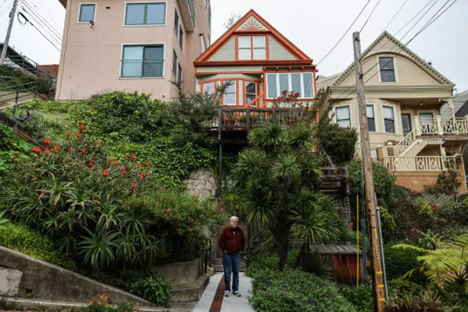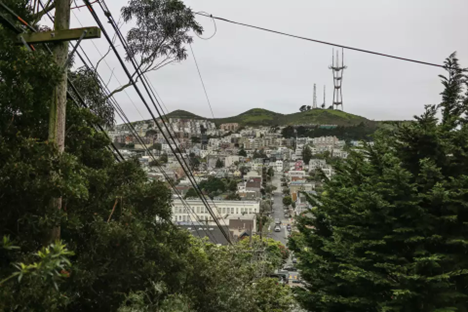By Megan Fan Munce March 30, 2024
https://www.sfchronicle.com/california/article/home-insurance-density-renewal-19361963.php

The insurance policy on Marc Snyder’s Noe Valley home in San Francisco was deemed not renewable because of his neighborhood’s density. Gabrielle Lurie/The Chronicle
Last October, Marc Snyder’s insurance company informed him it wouldn’t be renewing his homeowners insurance this year for a reason he had never heard before: density.
The letter from Liberty Mutual said Snyder’s home was “located in a region where the dwellings are considered to be too densely concentrated for us to continue to provide coverage.”
Snyder was confused. After all, though he lives in San Francisco — the second-most densely packed major city in the United States — his single-family home on a quiet street in Noe Valley is hardly the image of closely packed housing.
“I thought it made no sense,” he said.
Brokers and industry experts say “density” is a relatively new term being tacked onto a familiar concept — one that may be affecting more homeowners across the Bay Area as California’s insurance crisis worsens.
In an insurance context, density could mean two things, according to Amy Bach, executive director of the consumer advocacy group United Policyholders: either physical density or the concentration of a particular insurer’s policies.
In the first instance, an insurance company might not renew a home in a physically dense neighborhood because it’s worried about the risk of fire spreading quickly between tightly packed homes.
“You can do everything you can to make your home less likely to burn, but if your neighbor hasn’t done anything, and they’re right next door, their house is going to catch your house on fire,” Bach said.
In a city like San Francisco, the chief concern isn’t wildfires, but instead fires following earthquakes, according to Jerry Becerra, president of Barbary Insurance Brokerage in Oakland. One prominent example is the fires following the 1906 earthquake — which left the city with 60,000 destroyed buildings. Though major insurers do not cover damage from an earthquake itself, they are on the hook for fires that may result.
Alternatively, an insurer might cite density in cutting down the number of policies in a given area to reduce its liability in case of a catastrophic event, Bach said.
Non-renewing policies in order to reduce a company’s concentration of risk is not a new practice, according to Janet Ruiz, strategic communications director for the Insurance Information Institute, a nonprofit trade group.
Insurers are trying to avoid a situation where they might not be able to pay off all claims if a wildfire or flood devastates an area, Ruiz said. She pointed to the example of Merced Property & Casualty — an insurer that covered many of the homes devastated by the 2018 Camp Fire and subsequently became insolvent due to the costs.
In deciding which policyholders within a geographic area to non-renew, Bach said, an insurance company might consider a number of factors — such as the age of the home and whether the homeowner has any other policies with the company.
A city like San Francisco, where the median home value tops $1 million, also presents particularly high risk to insurers because of the high costs of rebuilding, according to Becerra.
Brian Sullivan, an independent insurance broker with Oakland-based Avail Insurance Solutions, said he has seen the amount of nonrenewals due to density pick up across multiple insurers in the past year.
The situation creates something of a feedback loop. Over the past two years, many home insurers — including State Farm and Allstate — have stopped writing new policies in California. Others have left the state altogether. Many have cited unprofitability due to wildfires, inflation and the cost of rebuilding. Others have also claimed difficulties due to California’s stringent insurance regulations, which require all rate hikes to be reviewed and approved by the state’s Department of Insurance.

The density of housing in Noe Valley in San Francisco could make it harder for some homeowners to find insurance. Gabrielle Lurie/The Chronicle
Companies facing financial difficulties in the state may cut back on their overall number of policies to preserve their ability to pay out claims, according to Ruiz.
That appeared to be the case with State Farm, which announced in March it would not renew approximately 30,000 homeowner policies in California in response to financial concerns. In public filings, State Farm said it would decide the nonrenewals in part based on whether the homes were located in “areas of significant concentration.” A spokesperson for State Farm declined to comment on what areas it considered to be significantly concentrated.
But with fewer insurers writing or renewing policies, consumers are left with fewer options — making the overall market more concentrated, according to Becerra.
Liberty Mutual, Snyder’s former insurer, confirmed it had not renewed some customers in San Francisco and said its priority was to retain the ability to “handle claims quickly and fairly.”
“We cannot comment on individual policy decisions; however, each risk is considered on its own merits, keeping in mind that we must prudently manage our exposure to ensure we are not disproportionately impacted in the event of widespread losses in a specific geographic area,” a spokesperson said.
But the information behind why a specific homeowner was chosen for nonrenewal — beyond reducing overall density — isn’t shared with homeowners or their brokers, according to Becerra.
For those who happen to get picked, like Snyder, the experience can be frustrating, though he knew he was far from alone. Snyder said he heard from multiple friends who also lost their coverage due to density.
Eventually, he was able to find new insurance through a broker recommended by a friend. Still, he said, the situation reduced his confidence in how insurers and state regulators are handling the ongoing crisis, he said.
“It took hours to try to line up an alternative insurer for the property and I’ve never filed any claims on it,” Snyder said. “It was insulting and frustrating and very time consuming.”
Reach Megan Fan Munce: megan.munce@sfchronicle.com
Megan Fan Munce is a reporter who joined the San Francisco Chronicle as part of the two-year Hearst Journalism Fellowship, spending her first year of the program at the Houston Chronicle. Munce grew up in San Jose before attending Northwestern University’s Medill School of Journalism, graduating with a B.S. and M.S. in journalism and a second major in political science. She previously worked as an audience engagement fellow and a reporting fellow at the Texas Tribune, as well as an audience intelligence intern for KQED. She can be reached at Megan.Munce@sfchronicle.com.

